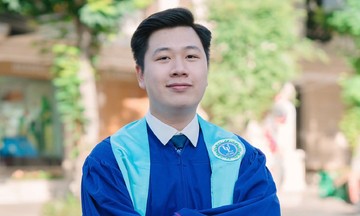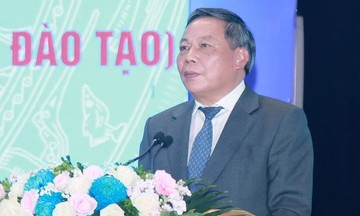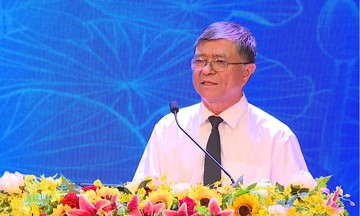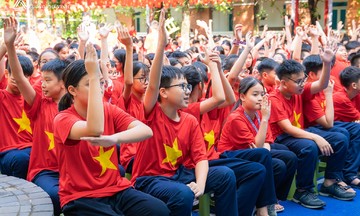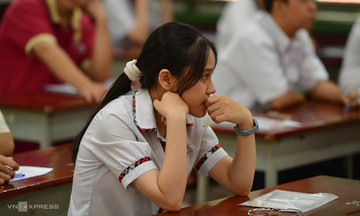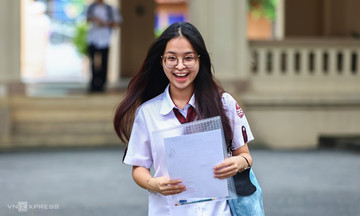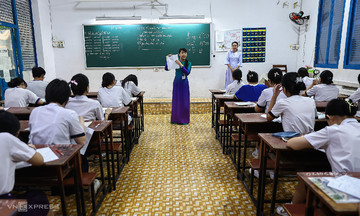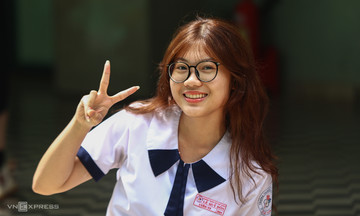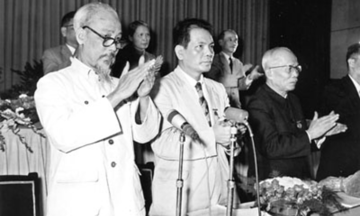Born in 1962 in Hue, Dr. Le Ba Khanh Trinh won a gold medal at the International Mathematical Olympiad (IMO) in 1979, along with a special prize for the most original solution. To date, he is the only Vietnamese person to receive this award.
He then studied at the Faculty of Mathematics, Moscow State University, Soviet Union (present-day Russia). After completing his doctoral dissertation, he returned to Vietnam and embarked on a teaching career, dedicating 35 years to the Department of Mathematics and Informatics at the University of Science and the High School for the Gifted, both part of Vietnam National University - Ho Chi Minh City.
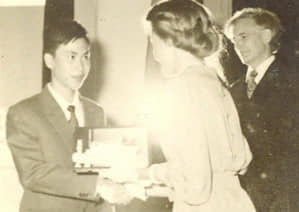 |
Le Ba Khanh Trinh receiving the award at the 1979 International Mathematical Olympiad in England. Photo: Archive |
Dr. Trinh recounted the rare stroke of luck that changed his life at the 1979 IMO in England.
The night before the official competition, he felt unwell with a mild fever and a persistent cough. When he read geometry problem number 3, he mistook the prompt for two points rotating in the same direction as rotating in opposite directions, but still arrived at the correct answer and was pleased. Only in the last 15 minutes, while reviewing his work, did he discover the error.
Realizing he wouldn't have enough time to solve it again from scratch, he was forced to find a way to reverse the incorrect assumption. This burst of insight led him to a shorter, simpler solution than the jury's official answer.
"I think it was a moment of divine inspiration," Dr. Trinh recalled. "Facing health issues and time constraints created an extraordinary strength, like a mental doping, allowing me to solve it again in just over 15 minutes. Perhaps it was a solution from God; under normal circumstances, I'm not sure I could have done it."
In 2019, when he met Professor Tony Gardiner, a jury member from the 1979 IMO, Dr. Trinh learned that the jury had thoroughly considered all possible solutions to the geometry problem. Upon reading his solution, they initially doubted its correctness, but one by one, they realized he was right. Professor Tony Gardiner was the one who proposed awarding him the special prize.
He said that without this turning point, the 17-year-old boy he was then would likely have joined his friends in applying to the University of Technology in Da Nang. The IMO win paved the way for his studies abroad, driven by the simple thought that his country faced many difficulties, and he needed to study well to contribute to his homeland.
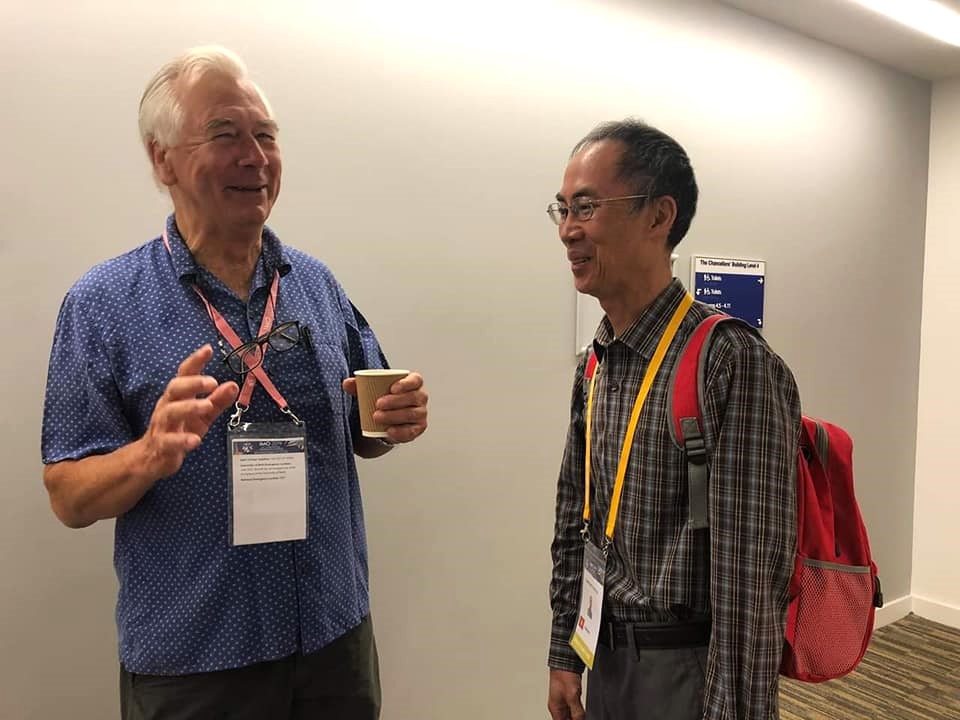 |
Dr. Trinh reunites with the jury member from the 1979 IMO at IMO 2019. Photo: Tran Nam Dung |
He comes from a family with a tradition in education: his father was a lecturer at Hue University of Medicine and Pharmacy, and his mother was a middle school math teacher. However, it wasn't until he studied with Professor Andrey Aleksandrovich Gonchar, an academician of the Russian Academy of Sciences, that the young man from Hue decided to pursue teaching. He was captivated by his professor's comprehensive teaching style, simple guidance that led students to deep understanding.
"They had a very simple style, but when they stood on the podium or at a seminar, they were like a different person, powerful in an indescribable way," Dr. Trinh reminisced. "Their teaching method took me from surprise to delight and then to admiration. I only hoped to learn a fraction of what they knew."
Upon returning to Vietnam, many expected him to pursue something grander than becoming a teacher. Looking back, he feels fortunate to have chosen the career best suited for him, considering it a "constant stroke of luck."
Dr. Trinh remembers his first day teaching in 9/1990, facing first-year students in the Department of Mathematics and Informatics at the University of Science. He admits his skills were still developing, but he was confident, talkative, and explained things emphatically, with clear introductions and conclusions, just like his Russian professors. His students loved it.
He later also taught at the High School for the Gifted after it was established. Most of the students were highly talented, making teaching more than just passive transmission of knowledge.
His teaching style evolved significantly. He sought ways to connect math to other subjects, transforming familiar problems into unfamiliar ones, difficult ones into easy ones, and vice versa. A correct solution wasn't enough; he aimed for elegant answers that aligned with logical thinking and showcased the beauty of mathematics.
Instead of lengthy explanations, he gradually became more concise, choosing the right moments to speak, guiding his students to discover methods and knowledge effortlessly.
According to Dr. Trinh, besides his love for mathematics, his students are his biggest motivators for self-improvement, prompting him to constantly learn and enhance his knowledge.
When a student presents a completely different solution, he reflects on why one approach is used over another, explaining to the students the elegance and subtleties within each problem.
Even with problems he's already solved, months or a year later, he might feel dissatisfied, wondering how he could have approached it so naively. He then revises and seeks more suitable solutions. Some former students, like Luong Minh Thang, now leading an AI development team at Google, still discuss math problems with him years later.
"Looking back, this is what I'm most proud of," Dr. Trinh reflects. "My progress has benefited my students while also satisfying my passion. I can feel my own growth, the clear improvement, and I still want to continue, not stop."
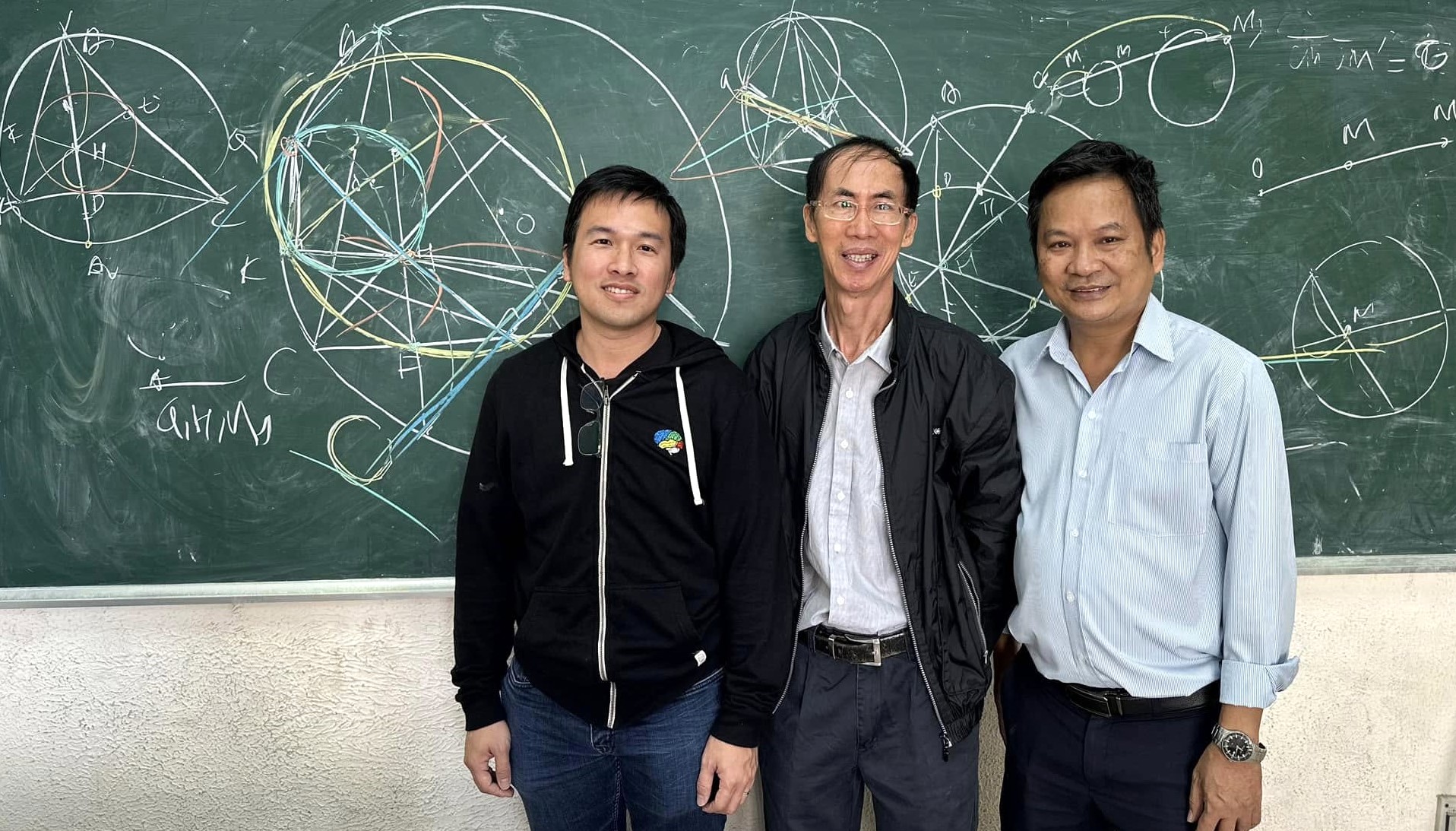 |
Dr. Trinh and Dr. Tran Nam Dung (far right) discuss a math problem when former student Luong Minh Thang (far left) visits the High School for the Gifted, 12/2023. Photo: Tran Nam Dung |
He explained that this process of self-learning and self-critique has continued for 35 years, and he remains inspired to continue. Even at 63, achieving even small improvements is challenging, requiring more effort and time than before. But he believes this proves this is the right career for him.
"I'm lucky to have chosen a job that I still want to continue even after retirement," Dr. Trinh states. "It would be truly unfortunate to work for 10, 20 years and feel bored, without any progress."
Therefore, his retirement in 3/2025 was merely administrative. He still dedicates most of his time to training gifted math students at the High School for the Gifted, in other provinces, and for the Olympiad team, even though the work is more demanding now, largely due to the pressures of age.
He once envisioned a peaceful retirement, building a small house to enjoy a simple life, reading leisurely, and reflecting on life.
"I would love that, but it's not the right time yet," Dr. Trinh said. "I still owe many math problems to people, and I haven't had the time to sit down and write them down properly. Work is still keeping me busy."
Le Nguyen



